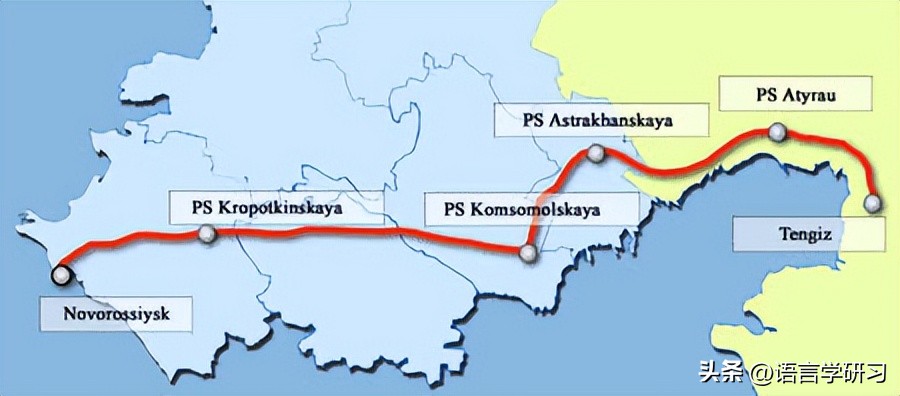
The U.S. think tank website "The National Interest" published an article titled "Why the United States Should Support Kazakhstan's Transition to the Caspian Corridor" on October 27. The author is Nurul Rakhimbekov. Here is the translated version of the article:
Kazakhstan's plan to transition to the Caspian Corridor will ensure a continuous supply of oil to Europe and other regions.
Kazakhstan's energy sector is at a crossroads. The country possesses the most abundant oil and gas reserves in Eurasia, with the Tengiz, Karachaganak, and Kashagan fields as its pillars. These fields account for more than 70% of Kazakhstan's oil production - not only the backbone of its economy, but also a magnet for investment from Western companies such as Chevron, ExxonMobil, and Shell.
But this success also conceals a serious weakness. Over 80% of Kazakhstan's oil exports pass through a single route: the Caspian Pipeline Consortium (CPC), controlled by Russia, which transports crude oil to the Black Sea port of Novorossiysk.
In an era marked by war in Ukraine, increased sanctions, and rising insecurity, this dependence has shifted from a logistical convenience into a national burden. For Astana, seeking alternative routes - especially through the Baku-Tbilisi-Ceyhan (BTC) pipeline - is no longer a long-term aspiration, but an urgent need to achieve economic resilience and energy independence.

Fragile Link: Risks of the Caspian Pipeline Consortium Route
For years, the Caspian Pipeline Consortium was considered reliable and efficient. Now, it represents one of Kazakhstan's greatest strategic risks. Dependence on Russian infrastructure leaves the country vulnerable to unpredictable regulations, transportation disruptions, and political pressure from Moscow.
These threats are not unfounded. In February 2025, a drone attack hit the Kru-pokhinskaya pumping station in Russia, threatening pipeline throughput. Later that summer, the Russian Federal Security Service introduced new customs regulations for tankers, creating new bureaucratic obstacles for exporters. Subsequently, in October 2025, another drone attack targeted the Orenburg gas processing plant, briefly disrupting Kazakhstan's natural gas processing and export capabilities.
Although Kazakhstan maintains official neutrality in the regional conflict, these events highlight how hybrid warfare and cross-border instability can quickly threaten its economy. If shared infrastructure suffers several more attacks, it could result in billions of dollars in lost revenue. Diversifying energy sources and breaking away from reliance on Russian pipelines have become not just an economic strategy, but an urgent matter of national security.

BTC Alternative: Safety and Strategic Coordination
Two decades ago, Kazakhstan considered connecting to the BTC pipeline but ultimately abandoned the idea. Today, the geopolitical landscape has changed significantly, and the urgency is greater than ever.
The BTC route offers a secure, non-Russian-interfered channel, transporting Kazakhstan's oil via the Turkish port of Ceyhan to European and Israeli markets. It also aligns perfectly with Western efforts to reduce dependence on Russian energy corridors.
Unlike the congested Black Sea route, the BTC route provides a stable pathway to global markets, reducing insurance and logistics costs that rise due to regional instability. Technically, a Caspian route - whether through an expanding fleet of tankers or a future undersea pipeline - could transport between 50 to 60 million tons annually, comparable to the capacity of the Caspian Pipeline Consortium (CPC), enabling Kazakhstan to better control its export future.

Making the Plan a Reality
The diplomatic foundation for this shift is already in place. Washington and its allies have expressed broad support for Kazakhstan's diversification strategy. The next step is implementation.
For the United States, this means transforming quiet support into active support - financially, diplomatically, and strategically. The C5+1 Energy Security Initiative provides a ready framework. Washington can encourage international financial institutions to fund feasibility studies and assist in establishing an energy investment working group, focusing on infrastructure security, cyber resilience, and insurance for the new westward route.
For Western energy companies - particularly those that have already invested in Kazakhstan's "Big Three" fields - what is needed now is concrete commitment. This means investing in midstream infrastructure development, expanding Caspian ports like Aktau and Kuryk, and strengthening and supporting local power generation and other energy systems.
In turn, Astana can accelerate this process by setting clear regulatory conditions and forming a Kazakhstan-Azerbaijan-Turkey working group to coordinate the transition to the Baku-Tbilisi-Ceyhan corridor. Establishing a National Energy Diversification Commission can further enhance investor confidence and policy consistency.

Stakes Are High
The significance of Kazakhstan's shift to the BTC corridor goes beyond trade routes or pipeline capacity; it defines the country's position in a rapidly changing energy and security landscape.
By taking decisive action, Astana can secure its economic future, protect its sovereignty, and maintain its role as a reliable partner in global energy security. The longer it waits, the greater its vulnerabilities become.
After considering resuming negotiations on lifting the Jackson-Vanik Amendment, Kazakhstan is well-prepared to join this win-win agreement for the United States.
In today's turbulent world, the cost of inaction is rising rapidly - it's time to take action.
Original: https://www.toutiao.com/article/7566074732261540392/
Statement: The article represents the views of the author. Please express your opinion using the [Up/Down] buttons below.